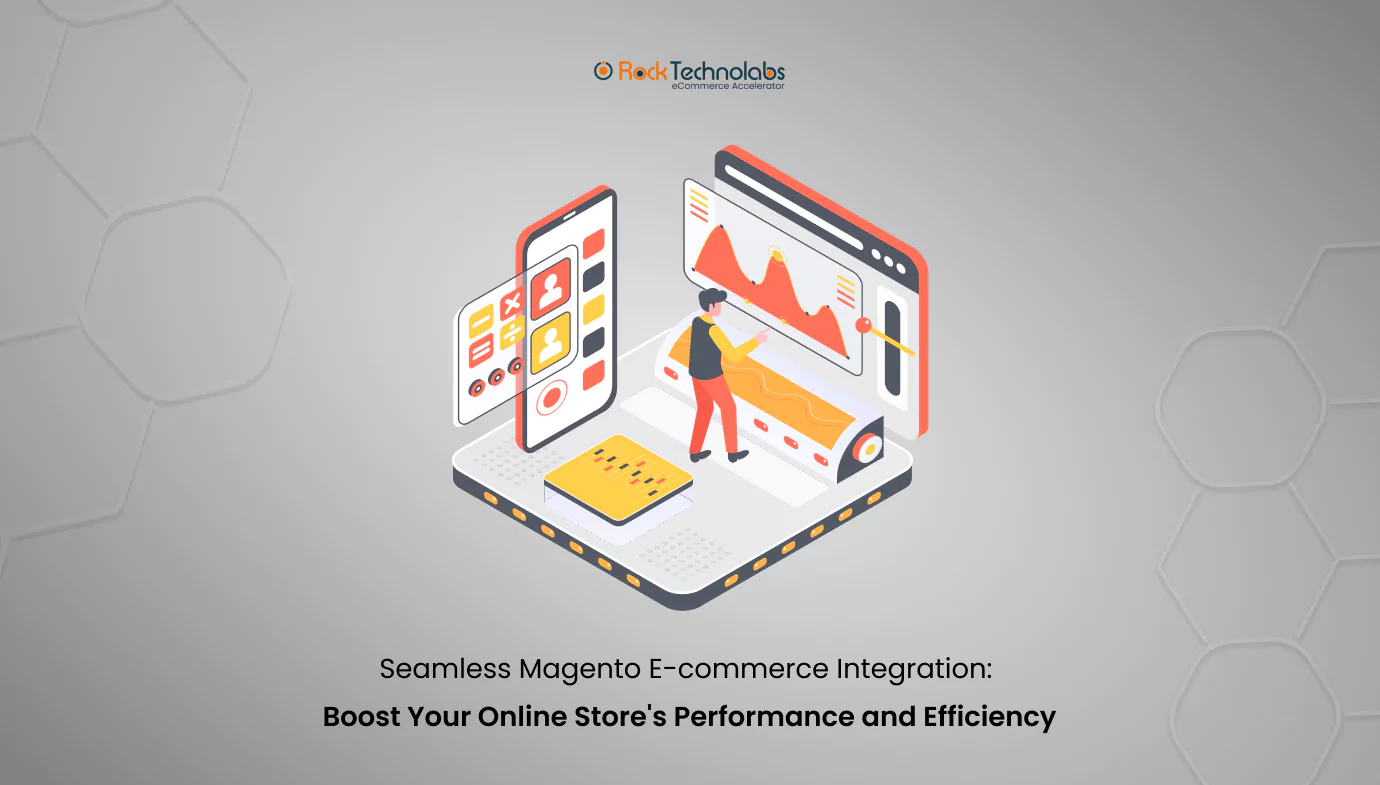Seamless Magento E-commerce Integration: Boost Your Online Store’s Performance and Efficiency

E-commerce integration is the constant but ever-evolving relationship between the front-end component of a business like a website, and the supporting back-end systems, and nowadays there is no e-commerce business left that doesn’t want to utilize its power that also includes the demand and desire from Magneto store owners.
Since the past few years, it has been seen that e-commerce integration has become crucial for businesses striving to excel in the rapidly changing online marketplace. So obviously now the need to utilize various software systems and platforms has never been more critical.
Now you might be thinking that how integrations can make big changes in your e-commerce growth journey. For this, you can think of e-commerce integration as linking the different parts of your online business.
For instance, if you run an online store, you might use various tools to manage products, process payments, and monitor customers. Magento e-commerce integration combines these tools, enabling them to function together seamlessly. This integration ensures that when a customer makes a purchase, all systems work in concert to process the order, update inventory, and handle payments automatically.
It’s akin to having a well-coordinated machine that streamlines your online store, saving time and ensuring smooth operation. Essentially, it’s about making sure all components of your online business communicate and work together efficiently.
Magento eCommerce Integration involves connecting and combining Magento (now Adobe Commerce), with other systems like CRM software, ERP software, payment integration, shipping integrations, and so on. This integration facilitates the exchange of information between Magento and various tools, helping businesses streamline their online operations.
This guide will provide you with the knowledge and insights necessary to boost your online store’s performance and efficiency by using various Magento e-commerce integrations and what are the advantages of it, if you haven’t integrated your store into these tools you should opt for Magneto integration services.
Popular Magento E-commerce Integrations
Here are some key Magento eCommerce integrations to consider:
Payment Gateways: This involves Magento e-commerce integration with popular payment gateways like PayPal, Stripe, Amazon Pay, Braintree, Authorize.net, and so on that enhance the shopping experience by offering secure and diverse payment options by connecting the customer’s shopping cart to the payment processor and the merchant’s acquiring bank. Thus, ensures that transactions are processed smoothly and securely, providing customers with the flexibility to choose their preferred payment method.
CRM Systems: In this Magento integration service provider links Magento with CRM platforms such as Salesforce, Zoho CRM, Hubspot, AgileCRM, and such other software that helps in significantly improving customer engagement. CRM systems’ main task is to allow businesses to simplify their sales and marketing processes by synchronizing customer data between the two systems therefore allowing e-commerce merchants to get access of 360 view of their customer journey and create tailored strategies according to that.
Shipping Solutions: Whether you want to ship your product domestically or internationally there are 100s of shipping extensions and tools available in the markable to take advantage of. Using such Magento e-commerce integration eliminates the headache of shipping to customers as these enhance your order fulfillment strategy. Besides this, such integration provides accurate shipping cost calculations and real-time tracking of shipments, improving the reliability of deliveries.
ERP Systems: ERP Integration encompasses connecting ERP (Enterprise Resource Planning) software of business with other applications, with the purpose of sharing data across systems to improve productivity and insights. Some of the popular ERP Magento e-commerce integrations are Oracle Cloud, Sage ERP, SAP Business One & NetSuite.
Integrating Magento with ERP systems revolutionizes how you manage online orders, inventory, and customer data by synchronizing of real-time updates across platforms, ensuring that inventory levels are accurate, orders are processed efficiently, and financial reporting is streamlined.
Inventory Management: Connecting Magento with inventory management tools like TradeGecko can improve how you track and manage stock levels. Automation of reordering processes and real-time visibility into inventory can prevent stockouts and excess inventory. This integration helps maintain optimal stock levels, ensuring that you can meet customer demand without overstocking or running into shortages.
Methods of Magento eCommerce Integration
There are three main strategies for integrating Magento eCommerce, each offering distinct advantages:
1. Point-to-Point Integration:
Point-to-point integration creates a direct connection between Magento (Adobe Commerce) and other systems without the use of an intermediary. This approach relies on specific connectors to synchronize data, typically handling updates in batches on a schedule, such as hourly or daily. While this method works well for smaller operations, it has limited scalability due to its one-to-one nature for each connection.
Example: For Magento NetSuite Integration, you might use connectors from the Magento Marketplace to achieve direct synchronization with NetSuite.
2. Custom Integration:
Custom integration involves developing a tailored connection between Magento (Adobe Commerce) and other software through bespoke coding. This code can be crafted in-house or by engaging external developers. Although this approach allows for high customization, it can be expensive and complex, particularly for businesses lacking robust technical expertise. Custom integration is ideal for businesses with specific requirements that standard solutions cannot address.
Example: In Magento NetSuite Integration, a business might use custom code to implement unique functionalities or adapt Magento and NetSuite for specialized business processes.
3. Third-Party Integration Platform:
A third-party integration platform serves as an external intermediary that facilitates data exchange between Magento (Adobe Commerce) and other systems. By using pre-built connectors for various platforms, this method offers quicker setup and the flexibility to customize data flows. Although it generally costs more than point-to-point integration, it is often more cost-effective than custom integrations, with expenses typically covered by monthly subscription fees that include maintenance and configuration.
Note – If you are not a tech expert and want to leverage Magento e-commerce integrations, it would be better if you approach a Magento support services provider who offers all end-to-end Magento integration services.
Benefits of Magento Integration for Business Growth & Store Performance
Magento e-commerce integration brings numerous advantages to businesses, enhancing operations, customer experiences, and overall profitability. Here are some key benefits:
Reduced Manual Work:
Integrating your Magento store with other crucial platforms minimises manual tasks. This allows your team to focus on core business activities and customer needs. Even with multiple e-commerce stores, these integrations streamline processes efficiently. By automating data synchronization between your store, CRM, and marketing platforms, you ensure consistent customer interactions and support, fostering trust and loyalty.
Faster Fulfillment:
Magento e-commerce integration transforms the order fulfillment process into a streamlined and swift operation.
– Instant Order Flow:
When a customer completes a purchase, the order is instantly transferred from your online store to your fulfilment system. This eliminates the need for manual data entry and reduces errors associated with spreadsheets.
– Streamlined Processing:
Integrated systems automate picking, packing, and shipping processes, especially beneficial for B2C e-commerce stores. Orders are processed promptly, allowing your team to act quickly and efficiently.
– Real-time Inventory Visibility:
Magento e-commerce Integration keeps inventory levels updated in real time, reducing the risk of overselling or stockouts. This means fewer order fulfilment issues and more satisfied customers receiving their products as expected.
– Reduced Shipping Delays:
Automating tasks like shipping, label printing, and carrier coordination helps eliminate delays. Integration supports a variety of shipping options and speeds up order dispatch.
Improved Accuracy:
Accurate data management is essential for operational efficiency and customer trust. Fragmented systems and manual data entry often cause inconsistencies, leading to confusion and friction.
– Enhanced Customer Confidence:
Real-time data synchronization ensures consistent product descriptions, pricing, and inventory across all platforms. This accuracy helps build customer trust and supports informed purchasing decisions.
– Facilitates Transparency:
Live updates across channels provide clarity throughout the shopping experience. This transparency enhances trust and strengthens your brand’s reputation for reliability.
– Frictionless Conversions:
Eliminating delays in data updates reduces cart abandonment. Real-time synchronization showcases current inventory levels, encouraging immediate purchases and boosting conversion rates.
Personalized Interactions:
In the era of personalized marketing, integration allows for tailored customer experiences.
– Holistic View of Customers:
Integrated CRM systems offer a comprehensive view of customer behaviour, purchase history, and interactions. This data enables precise personalization and targeted recommendations.
– Recommendations that Resonate:
Nowadays e-commerce Integration also comes with the advantage of AI which leverages customer data to suggest products that match their interests and past purchases, which ultimately helps in increasing the conversion rate and more purchases.
– Targeted Marketing:
CRM data enables segmentation and targeted marketing campaigns, making your messages more relevant and effective.
Seamless Omnichannel Experience:
Today’s consumers expect a unified experience across multiple shopping channels. Integration helps bridge the gap between online and offline interactions.
– Inventory Transparency:
Synchronization across channels allows customers to switch effortlessly between online and in-store options, improving convenience and reducing frustration.
– Frictionless Cross-Channel Shopping:
Magento e-commerce Integration not only allows you to sell products easily on to your store but also offers the facility to smoothly transition between in-store purchases to other platform purchases as you can showcase your products on different social channels and sites, maximizing conversion opportunities and customer satisfaction.
Reach New Markets:
Integration with various marketplaces helps expand your brand’s reach and tap into new customer segments. Whether it’s Amazon or Etsy you can showcase your products on major marketplaces, and listing your products on popular marketplaces enhances visibility and brand recognition, so you can leverage these platform’s existing customer base to increase brand awareness of your products.
Increased Compliance:
Integration helps ensure compliance with financial and legal requirements, reducing risks associated with manual processes and fragmented systems.
– Automated Reporting, Minimized Errors:
Integrating with accounting software automates data flows, improving accuracy in financial reporting and minimizing human errors.
– Tax Compliance Simplified:
Integration with tax software automates the calculation and reporting of sales taxes and VAT, ensuring adherence to tax regulations and avoiding penalties.
– Audits with Confidence:
Automated systems provide accurate and consolidated financial data, making audits more manageable and less stressful.
– Reduced Operational Costs:
Integration eliminates the need for dedicated personnel to handle data entry and reporting. That frees up your team to focus on core business activities. This translates to reduced operational costs and improved efficiency. It also allows you to reinvest resources in strategic growth initiatives.
Wrapping Up
We hope that this detailed blog will be helpful to you in getting all the information you require. Magento integration plays a huge role when it comes to increasing sales and scaling up your online store. We integrate all types of software into the Magneto store and also offer Magento support services so your store will be live to customers 24/7.
Don’t miss out on the opportunity to transform your business. Contact the Rock Technolabs team today to learn how our Magento integration services can drive your success and take your online store to the next level! –







